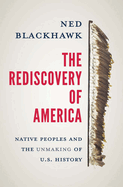
Historian Ned Blackhawk (Western Shoshone) offers a comprehensive, epic re-framing of United States history in The Rediscovery of America: Native Peoples and the Unmaking of U.S. History. "Scholars have long conflated U.S. history with Europeans, maintaining the United States evolved from its British settlements," Blackhawk notes in the introduction--an error he sets out to correct as he examines the important and often-overlooked role of Indigenous peoples in the formation of modern-day America. "[It] is time to reimagine U.S. history outside the tropes of discovery that have bred exclusion and misunderstanding."
As a professor of history at Yale University, a lifelong student of Native American history and law, and author of several previous books on the subject (Indigenous Visions; Violence over the Land), Blackhawk is no stranger to the study of Native American history. The Rediscovery of America, though, marks an impressive addition to an already notable résumé, offering a sweeping "reorientation of U.S. history" from the earliest days of colonialism through to the present. He grounds this work and analysis in decades of research and scholarship, including material from tribal projects that have worked to expose a history often overlooked by other studies of the United States. Dozens upon dozens of examples pepper the text--battles and clashes, treaties and settlements, protests and campaigns, all highlighting the ways Indigenous peoples have influenced the course of U.S. history. Blackhawk credits nearly 200 tribal museums and cultural centers in his research, as well as "oral traditions, ethnographies, Indigenous languages, and the archival records from multiple empires" that contribute to his work. (Detailed endnotes and frequent citations provide additional resources.)
To call the resulting study comprehensive feels like something of an understatement; The Rediscovery of America offers not only a history of Indigenous peoples in the U.S., but a careful examination of the ways this history is woven into--and ultimately, has influenced--the evolution of the U.S. from a collection of colonies to the country it is today. "Rather than seeing U.S. and Native American history as separate or disaggregated, this project envisions them as interrelated," writes Blackhawk, highlighting the contributions of Indigenous peoples in establishing a country, and not merely recounting the subjugations of these populations.
Blackhawk focuses on the "interrelatedness of Native-newcomer relations, collectively asking whether there is potential for building an alternate U.S. story that is not trapped in the framework of European discovery and European 'greatness.' " In the first half of the book, Blackhawk "underscores the centrality of violence to the making of early America," through accounts of early encounters--and conflicts--between Native Americans and European empires seeking to expand their land and resource holdings in the "new" world. This lays the groundwork for an exploration of continued violence in the form of law and policy as the United States consolidated its political power following the Civil War, offering new ways of considering the U.S. Constitution--its drafting and implementation over the decades that followed--within the context of Native American history and influence.
Throughout The Rediscovery of America, Blackhawk notes how interactions with Native American people and tribes "shaped the contours of federal policy." This interweaving moves through decades of termination-minded policies to the "new partnerships" of today, marked by a transfer of power from the federal government back to tribal communities under legislation passed in 1975. Notably, however, today's Native Americans are still plagued by disproportionate rates of poverty, poor health outcomes, limited economic development, and low educational attainment--consequences of intentional policy over centuries of United States history.
At more than 600 pages, the weight of The Rediscovery of America comes in the time required to sit with the violence inherent in the stories told here, and in the challenge Blackhawk presents to readers: "[t]o reimagine U.S. history outside the tropes of discovery that have bred exclusion and misunderstanding." A true historical accounting must recognize the role of violence, genocide, exclusion, and dispossession in the origin story of a country that purports to be a bastion of freedom and democracy--"How can a nation founded on the homelands of dispossessed Indigenous peoples be the world's most exemplary democracy?" Simply put, not grappling with this question limits the ability of U.S. citizens to understand their history, present-day politics, and possibilities for the future. Perhaps more importantly, ignoring the richness and gifts of peoples long overlooked, intentionally and not, does an extreme disservice to those who came before, and the power and activism they have wielded to effect change over centuries of history. In that vein, The Rediscovery of America should be considered essential reading for anyone with an interest in history, justice, law, or politics--and especially the intersection of these topics. --Kerry McHugh

